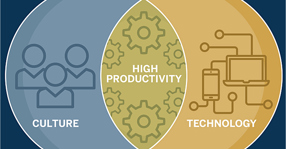We’re pleased to provide you with insights like these from Boston Private. Boston Private is now an SVB company. Together we’re well positioned to offer you the service, understanding, guidance and solutions to help you discover opportunities and build wealth – now and in the future.
Working with an advisor to implement a few steps can go a long way
Cash management plays a pivotal role for all businesses; therefore, companies should handle matters pertaining to cash with the utmost care. Nonprofits should be especially vigilant as they frequently fall victim to cybercrimes, especially when finance departments are strapped for time and resources.
You can ensure that your nonprofit is in tip-top shape with these simple steps to improve nonprofit financial management.
Work with your nonprofit financial advisor
Money management is one area where nonprofits seek assistance. They often turn to a nonprofit financial advisor who will act as a partner and help to implement best practices. Interest rates have been on the rise for the last couple of years and as such, organizations with cash on hand want to ensure that they're making the most of it.
Many banks utilize Account Analysis as a means to apply commercial bank fees. Account Analysis can be beneficial in helping to reduce or completely offset bank fees. Credits are earned for the balances maintained; therefore, managing those Earnings Credits is important. Earn too little and you may pay fees. Earn too much and you waste an opportunity to earn interest. When this happens, balances are generating more credits than needed. Organizations can shift some of their balances into money market funds or other vehicles to take advantage of short-term interest rates. Nonprofits have the potential to earn a lot in interest just by being more efficient.
Use alert features
There are many sophisticated tools to help manage and detect fraud, but one of the simplest and most effective ways to beef up fraud prevention is to keep a closer watch on the account itself. Bank accounts often have alert features like transaction and balance alerts that can notify you of any unusual activity. These alerts are simple but go a long way in cutting down on fraud. After all, the sooner you see something amiss, the sooner you can do something about it.
Be proactive against fraud
Fraud is a challenge that all organizations face. Two of the most common threats include check fraud and ACH fraud.
Check fraud alone was responsible for more than $18 billion in losses last year in the U.S. Using Positive Pay, our advanced, web-based security tool, can help you mitigate fraud by reconciling checks and ACH transactions to ensure that the amounts match and that no fraudulent transactions are executed without your approval.
Maintaining a secure account structure is another proactive means to protect accounts. It's not uncommon for nonprofits or even global participants to send and receive international wires. However, we advise that you maintain a separate account for that activity. Giving your primary operating account information to overseas vendors — even ones you have long-term relationships with — can be problematic because you don't know how the information is controlled. It's easier to limit or close down a side account than to deal with potential problems in your main operating account.
A nonprofit financial advisor can be a great partner to improve nonprofit financial management. Organizations can take comfort in knowing that money management is optimized, take steps to combat fraud and most importantly, create long-term financial stability. That gives nonprofits more time to devote to their core missions.














